11 Fennel Seed Substitutes for a Licorice-Flavored Twist
When you’re cooking up a dish that calls for fennel seeds, but they’re nowhere to be found, don’t panic – you’ve got options. You’re likely familiar with the distinctive licorice flavor fennel seeds bring, but did you know there are several alternatives that can replicate, or even elevate, that flavor?
From sweet and pungent to nutty and earthy, the right substitute can make all the difference. You might be surprised at the versatility of these alternatives, and how they can add depth and complexity to your recipes. So, which ones will you turn to?
At a Glance
- Anise seeds, star anise, and licorice root offer licorice-like flavor substitutes for fennel seeds in recipes.
- Caraway seeds, coriander seeds, and cumin seeds provide nutty and earthy flavor substitutes with distinct undertones.
- Dill seeds, celery seeds, and chervil offer fresh and herbaceous flavor substitutes for a lighter taste.
- Mustard seeds and fenugreek seeds introduce pungent and bold flavor substitutes with radical flavor shifts.
- When substituting fennel seeds, start with small amounts and adjust to taste, as each alternative has unique flavor profiles and intensities.

Anise Seeds: The Obvious Choice
Your fennel seed recipe has hit a snag – you’ve run out of the anise-flavored spice. Don’t panic; there’s a straightforward solution.
Reach for anise seeds, the obvious substitute. With a history dating back to ancient civilizations, anise seeds have been used for centuries to flavor dishes, from sweet treats to savory meals.
Their licorice-like flavor profile makes them an ideal replacement for fennel seeds.
Anise seeds boast numerous benefits, too. They’re rich in antioxidants, fiber, and minerals, making them a nutritious addition to your recipe.
Additionally, anise seeds have natural digestive properties, which can help alleviate bloating and discomfort. When substituting fennel seeds with anise seeds, keep in mind that anise seeds are slightly sweeter and more potent.
Start with a small amount and adjust to taste. With anise seeds, you’ll achieve a similar flavor profile to fennel seeds, minus the hassle of searching for a rare spice.
Caraway Seeds for a Similar Flavor
Caraway seeds, with their distinct nutty flavor and crunchy texture, offer a similar flavor profile to fennel seeds, making them a suitable substitute in many recipes.
You’ll find that caraway seeds have a slightly bitter and earthy undertone, which complements the sweetness of fennel seeds. When using caraway seeds as a substitute, keep in mind that they’ve a more robust flavor, so start with a smaller amount and adjust to taste.
One of the significant caraway seed benefits is their high fiber and antioxidant content, making them a nutritious addition to your dishes.
You can incorporate caraway seeds into a variety of caraway seed recipes, such as bread, salad dressings, and roasted vegetables. They pair particularly well with cabbage, carrots, and potatoes.
When substituting caraway seeds for fennel seeds, use a 1:1 ratio, but be prepared for a slightly different flavor profile. Overall, caraway seeds are an excellent choice for those looking for a similar flavor to fennel seeds with added nutritional benefits.
Licorice Root for Intense Flavor
With its pungent, sweet flavor and aroma, licorice root offers an intense alternative to fennel seeds in many recipes.
You may be surprised to know that licorice root has been used for centuries, dating back to ancient Chinese and Greek civilizations, where it was valued for its medicinal properties.
When using licorice root as a substitute, keep in mind the following benefits:
- Unique flavor profile: Licorice root adds a deep, rich, and slightly sweet flavor to dishes, making it an excellent addition to braises, stews, and roasted vegetables.
- Digestive aid: Licorice root has been shown to soothe digestive issues, such as heartburn and indigestion, due to its anti-inflammatory properties.
- Cough relief: The root has natural expectorant properties, making it a popular ingredient in cough remedies and teas.
Star Anise for a Sweet Twist
If you’re looking for a fennel seed substitute that adds a sweet, licorice-like flavor without the pungency of licorice root, star anise is an excellent option.
This fragrant spice has been a staple in Eastern traditions for centuries, and its unique flavor profile makes it an ideal substitute in many recipes.
Star anise has a distinct sweetness that complements a variety of fragrant pairings, from citrus to cinnamon.
When using star anise as a fennel seed substitute, keep in mind that it’s slightly sweeter and more delicate.
Start with a small amount and adjust to taste, as its flavor can quickly overpower other ingredients.
In baked goods, star anise pairs particularly well with sweet spices like cardamom and ginger.
It’s also a great addition to savory dishes, adding depth to braises and stews.
Just be mindful of the amount you use, as its sweetness can quickly dominate other flavors.
With its unique flavor and versatility, star anise is an excellent choice for those looking to add a sweet, licorice-like twist to their recipes without the pungency of licorice root.
Dill Seeds for a Fresh Take
Diving into the world of fennel seed substitutes, you’ll find that dill seeds offer a fresh, bright flavor that’s a far cry from the anise-like taste of fennel.
When you’re looking for a substitute that will add a new dimension to your dishes, dill seeds are an excellent choice.
- Fresh flavor profiles: Dill seeds have a light, airy flavor that won’t overpower your dishes.
- Dill seed benefits: They’re packed with vitamins, minerals, and antioxidants, making them a nutritious addition to your meals.
- Versatility: Dill seeds pair well with a variety of ingredients, from fish and vegetables to soups and salads.
Using dill seeds will give your dishes a revitalizing twist, perfect for those who prefer a lighter flavor.
Just be aware that dill seeds have a milder flavor than fennel, so you may need to use more to achieve the desired taste.
With their unique flavor and numerous benefits, dill seeds are an excellent fennel seed substitute for those looking to mix things up.
Celery Seeds for a Mellow Taste
You’ve explored dill seeds as a fresh alternative to fennel, but if you’re looking for a more laid-back flavor, celery seeds are worth considering.
These tiny seeds pack a subtle punch, offering a mellow taste that’s perfect for those who find fennel overwhelming. Celery seeds have a fresh, herbaceous quality that complements a variety of dishes without dominating the flavor profile.
When used in moderation, they add a nuanced depth to soups, stews, and braises.
In contrast to fennel’s bold licorice flavor, celery seeds have a more delicate, anise-like taste.
This makes them an excellent choice for dishes where you want to add a hint of freshness without overpowering the other ingredients. With their mellow undertones, celery seeds can help create a sense of balance and harmony in your cooking.
Coriander Seeds for a Warm Flavor
Warm spice blends and aromatic flavors await with coriander seeds, a fennel substitute that brings a distinctly warm, earthy tone to your cooking.
You’ll notice that coriander seeds don’t have the same licorice flavor as fennel, but they share a similar warm, aromatic quality that works beautifully in many recipes.
When you use coriander seeds as a substitute, you’ll get a flavor that’s more grounded and earthy, with hints of citrus and a slightly bitter undertone.
- Add depth to stews and braises: Coriander seeds pair well with rich, slow-cooked meats and vegetables, adding a warm, comforting flavor that’s perfect for cold winter nights.
- Elevate roasted vegetables: Toss sliced or chopped vegetables with olive oil, coriander seeds, and a pinch of salt for a simple, flavorful side dish that’s sure to impress.
- Create aromatic spice blends: Mix coriander seeds with other spices like cumin, cinnamon, and cardamom to create a custom blend that captures the essence of fennel without the anise flavor.
Cumin Seeds for a Smoky Twist
Cumin seeds bring a smoky, savory quality to dishes, making them an intriguing substitute for fennel.
You’ll notice the difference in flavor profiles immediately. While fennel seeds have a sweet, anise-like flavor, cumin seeds introduce smoky undertones that add depth to your dishes.
This makes them an excellent choice for savory recipes, particularly those with meats or vegetables.
When substituting cumin seeds for fennel, keep in mind that the flavor will shift dramatically.
Cumin seeds have a warm, earthy quality that pairs well with spices like paprika and chili powder.
They’re commonly used in Mexican and Indian cuisine, so if you’re looking to add a global twist to your cooking, cumin seeds are an excellent choice.
However, be cautious not to overdo it.
Cumin seeds can quickly overpower other flavors, so start with a small amount and adjust to taste.
You can also toast the seeds to bring out their natural oils and intensify the flavor.
With a little experimentation, you’ll find that cumin seeds can add a rich, smoky dimension to your cooking that’s hard to resist.
Mustard Seeds for a Pungent Flavor
Flavors collide when you substitute mustard seeds for fennel, introducing a pungent, tangy taste that’s sure to awaken your taste buds.
You’ll experience a radical shift from the anise-like sweetness of fennel to the bold, fiery essence of mustard.
This substitution isn’t for the faint of heart, but for those willing to take a culinary risk.
Three key aspects bear examination when using mustard seeds as a fennel substitute:
- Mustard seed benefits: Mustard seeds are packed with antioxidants, omega-3 fatty acids, and fiber, making them a nutritious addition to your dishes.
- Mustard flavor profiles: Mustard seeds have a sharp, pungent flavor that can overpower other ingredients if used excessively. Start with a small amount and adjust to taste.
- Balancing flavors: To counterbalance the boldness of mustard seeds, pair them with sweet or creamy ingredients, like honey or yogurt, to create a harmonious flavor experience.
Fenugreek Seeds for a Nutty Taste
In the world of spice substitutions, fenugreek seeds offer a unique alternative to fennel, introducing a nutty, slightly bitter flavor that will redefine the character of your dishes.
You’ll find that fenugreek seeds have a distinctive, earthy aroma that’s reminiscent of maple syrup. This makes them an excellent choice for Indian recipes, where they’re commonly used to add depth to curries and stews.
When substituting fenugreek seeds for fennel, keep in mind that they’ve a stronger flavor, so start with a smaller amount and adjust to taste.
One of the fenugreek benefits is its high nutritional value. Rich in protein, fiber, and various vitamins and minerals, fenugreek seeds can elevate the health profile of your dishes.
They’re also known to aid digestion and reduce inflammation. When using fenugreek seeds, be sure to toast them lightly to bring out their flavor and aroma.
Grind them in a spice grinder or mortar and pestle to release their full potential. With their nutty, slightly bitter flavor, fenugreek seeds are sure to become a staple in your spice cabinet.
Chervil for a Delicate Anise Flavor
You’re likely familiar with chervil’s delicate, anise-like flavor, which makes it an excellent substitute for fennel seeds in many recipes.
Chervil’s subtle sweetness and mild licorice taste make it a popular choice in French cuisine, particularly in dishes like bouillabaisse and creamy sauces.
When using chervil as a substitute, keep in mind the following:
- Start with a small amount: Chervil’s flavor can quickly overpower other ingredients, so begin with a small amount and adjust to taste.
- Choose fresh over dried: Fresh chervil has a more vibrant flavor than dried, so opt for fresh whenever possible.
- Pair with complementary flavors: Chervil pairs well with ingredients like lemon, parsley, and tarragon, which enhance its anise variations.
FAQs
Can I Use Fennel Seed Substitutes in Sweet Dishes Like Cakes and Cookies?
You wonder if fennel seed substitutes will work in sweet treats like cakes and cookies, but honestly, they might alter the flavor profiles too much, leaving your baked goods tasting unbalanced and confusing.
Are Fennel Seed Substitutes Suitable for People With Digestive Issues?
You’re wise to ponder your digestive health; with fennel allergies and digestive triggers, you should exercise caution when consuming fennel seed substitutes, as they can still irritate your system, so choose alternatives carefully to avoid discomfort.
Can I Grow My Own Fennel Seed Substitutes at Home?
You can try growing your own fennel varieties at home, but be prepared for meticulous seed harvesting; it’s a time-consuming process requiring patience and attention to detail, but the reward is fresh, fragrant seeds tailored to your taste.
Are Fennel Seed Substitutes More Expensive Than Regular Fennel Seeds?
You’re curious if fennel seed substitutes break the bank, right? Honestly, they can be pricier than regular fennel seeds, altering your flavor profile and spice rack dynamics, but the unique twist might just be worth the extra cost.
Can I Combine Multiple Fennel Seed Substitutes for a Unique Flavor?
When experimenting with flavor profiles, you’re free to combine multiple fennel seed substitutes, but be cautious of overpowering your dish; carefully balance spice blends to avoid clashing flavors, and don’t be afraid to adjust to taste.
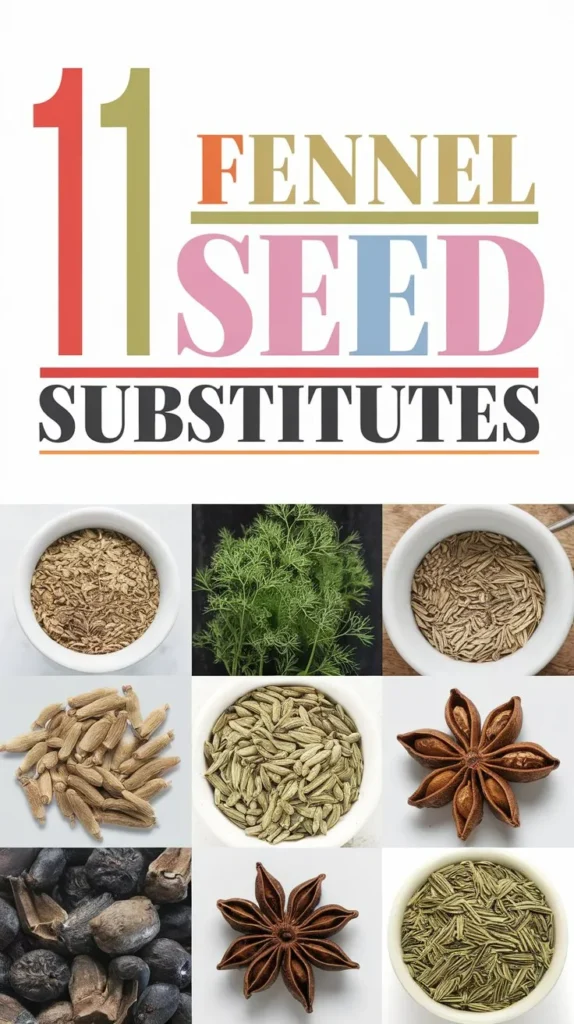
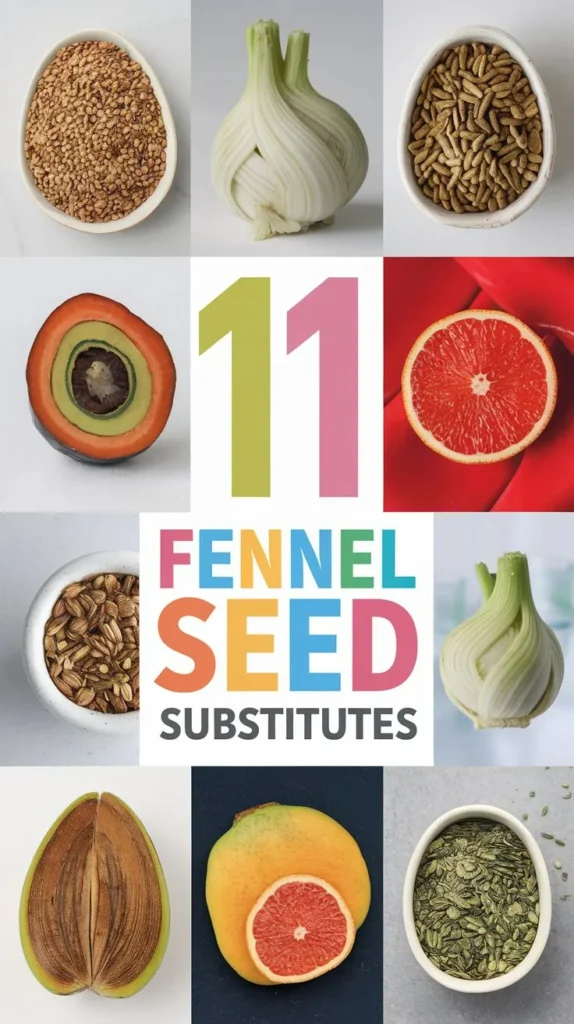
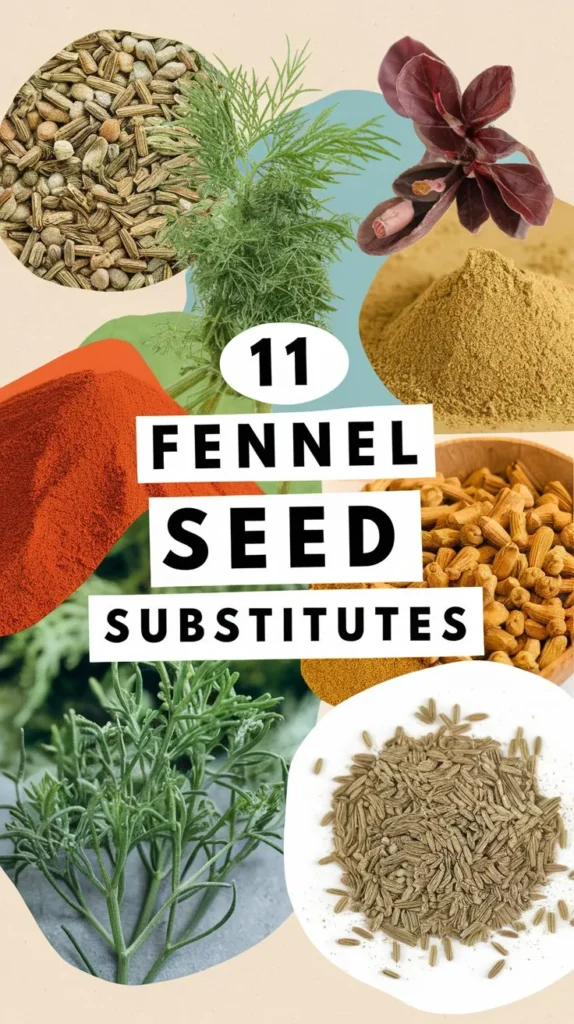
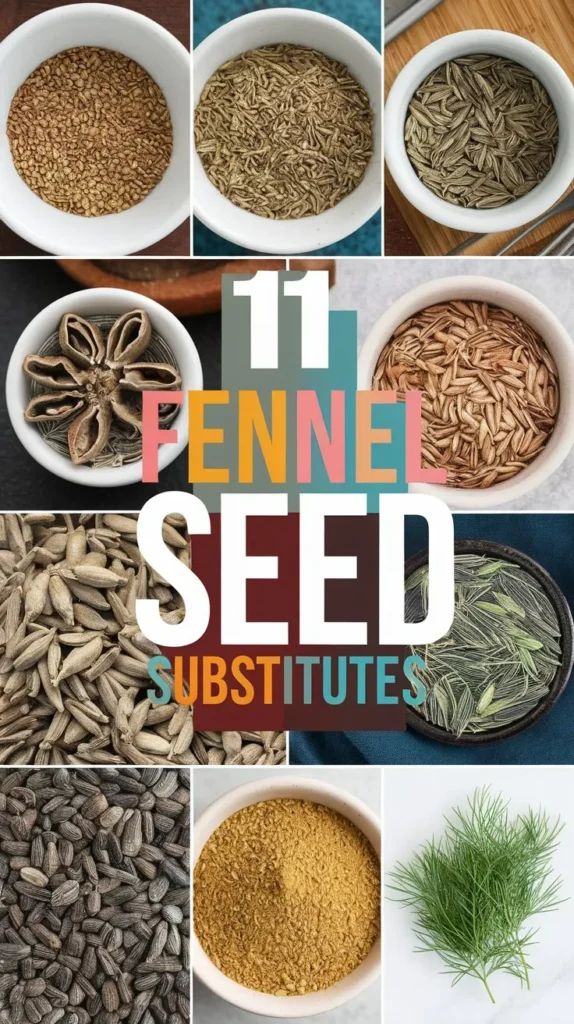


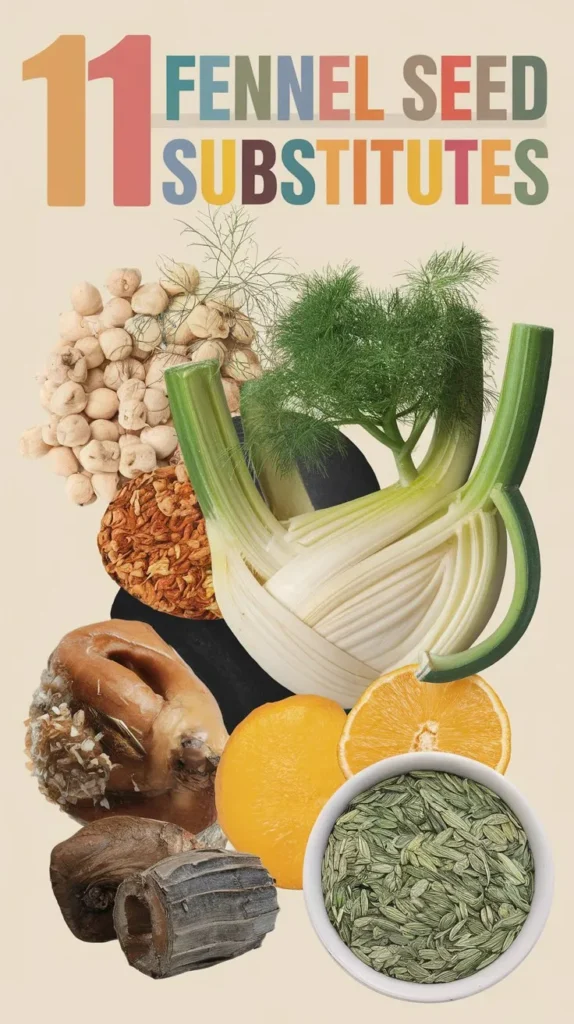
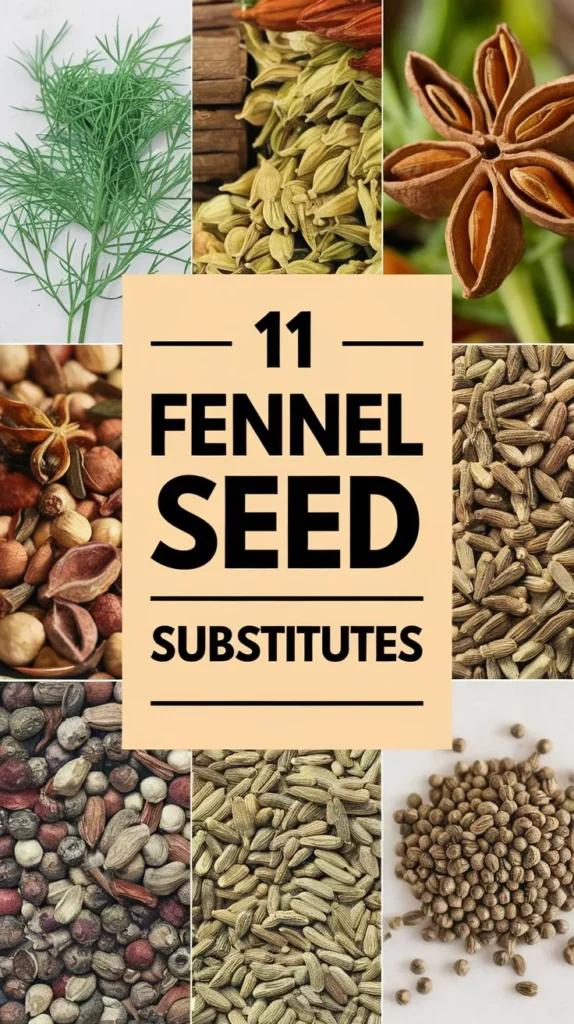

DK Jacks is a passionate food enthusiast, recipe developer, and culinary explorer. With a love for both traditional and innovative flavors, DK brings a fresh perspective to the kitchen. When not experimenting with new ingredients, you’ll find DK capturing food moments through the lens or sharing cooking tips with fellow foodies.🍽️📸✨







